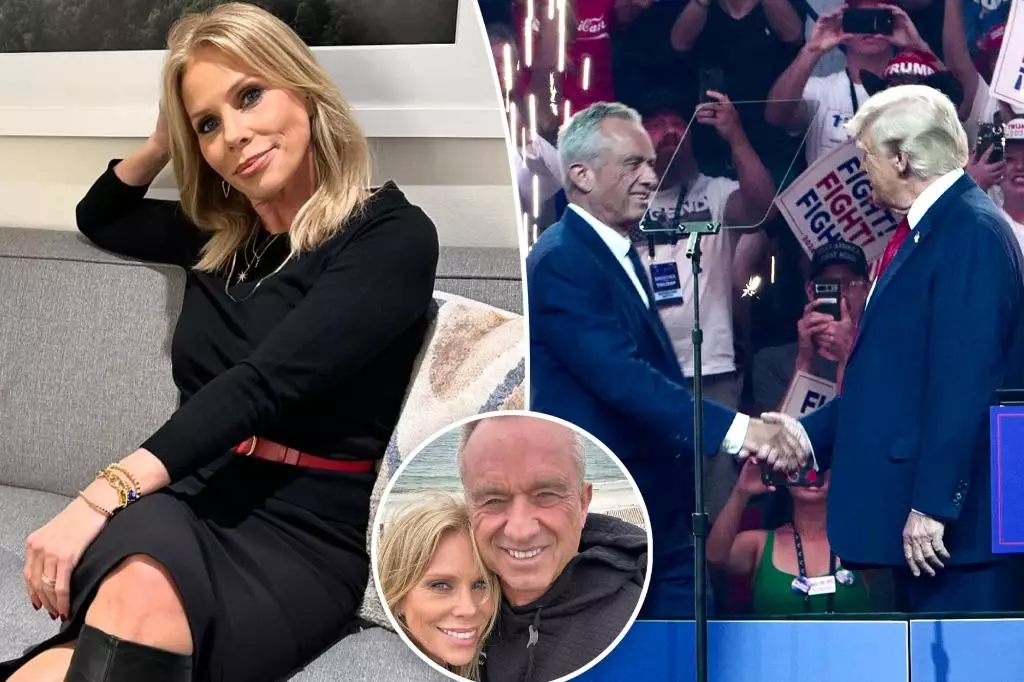Throughout the past week, the turbulent dynamics surrounding Cheryl Hines and Robert F. Kennedy Jr. have captivated public interest, encapsulating a narrative that intertwines personal betrayal with the larger backdrop of American politics. As rumors of a potential divorce circulate, fueled by his controversial relationship with not just his marriage but also with former President Donald Trump, the emotional turmoil becomes even more pronounced. The implications of this personal crisis highlight both the inherent complexities of their decade-long marriage and the broader cultural shifts affecting political allegiances in contemporary society.
Cheryl Hines, celebrated for her role in “Curb Your Enthusiasm,” appears to be wrestling with the fallout from her husband’s indiscretions. Jerry Oppenheimer, author of several books on the Kennedy family, indicates that while Hines might be deeply hurt by her husband’s extracurricular relationship with New York Magazine’s Olivia Nuzzi, it is his alignment with the MAGA movement that truly unsettles her. Described as “blindsided” by the affair, Hines reportedly feels devastated and angry, but the undercurrents suggest a more significant clash of political identities between her Democratic beliefs and her husband’s surprising shift towards Republicanism.
An insider noted that while Hines was aware of Kennedy’s past as a known womanizer, the degree to which she must now navigate his relationship with Trump and his potential political ambitions stuns her. This gives rise to the question: are personal relationships inextricably tied to political orientations? For Hines, her marriage to a Kennedy—a family steeped in Democratic ideology—took an unexpected, startling turn when her husband openly embraced a past president whose policies are antithetical to her life’s long-standing values.
As revelations about Kennedy’s affair emerged, many observers speculated that the resulting scandal would drive a wedge between the couple. Sources suggest that Hines’s anger over the affair pales compared to her discomfort with Kennedy’s current political affiliations. The core issue seems to stem from a broader ideological discrepancy rather than from infidelity alone. Hines’s support for her husband’s political career appears strained, particularly in light of his endorsement of Trump—a figure Hines openly criticizes.
This discontent culminates in the sources revealing a community nuanced by political apparitions, where some factions within Trump’s circle perceive Hines not just as an outsider but as an adversary given her liberal politics. Such sentiments raise the alarms of division, leading to speculation that some Republicans might even wish for the couple’s estrangement as they foresee a Kennedy in a potential administration role should Trump reclaim office.
The Celebrity Factor: Public Scrutiny and Personal Struggles
Kennedy’s unfaithfulness amounts to more than just scandalous headlines; it reflects an intricate tapestry of disappointment, dissatisfaction, and disruption within what once seemed a stable and successful union. The public registry of Hines’s feelings becomes a spectacle, with her recent jewelry choices serving as a symbolic protest or purging of her marital tie. Initially spotted without her wedding ring, her subsequent public displays of the ring demonstrate a conflicted psyche navigating between defiance and commitment.
Moreover, the ongoing saga of Kennedy, a man once seen as settling down, combined with his increasingly exposed interior conflicts—highlighted through personal diaries detailing “lust demons”—paints a picture of duality intertwined with political aspirations. His public image stands in direct contrast to the private turmoil he seems unable to escape. The intersection of his political ambitions, romantic escapades, and public perception entwines with Hines’s narrative, adding layers of complexity to the couple’s personal saga.
The Future: Navigating Crisis in a Political Lens
In a landscape often dominated by political maneuvering, the Hines-Kennedy dilemma emerges as an emblematic struggle of personal beliefs versus public allegiance. As Cheryl Hines contemplates the potential dissolution of her marriage, she must not only evaluate her emotional happiness but also consider the lasting implications such an action may have on her standing in the political arena.
Is Hines prepared to sever ties with a figure who, despite the heartache, still holds political relevance? Will her quest for personal integrity and aligned beliefs prompt her to make decisions that could reverberate through the socio-political fabric of the country?
In navigating her emotions, Hines embodies a critical juncture for many Americans faced with similar individual conflicts amid divisive ideologies. As the drama unfolds, it enhances our understanding of how personal relationships and public lives intersect, prompting readers to reflect critically on the broader implications tethered to such emblematic narratives.


Leave a Reply